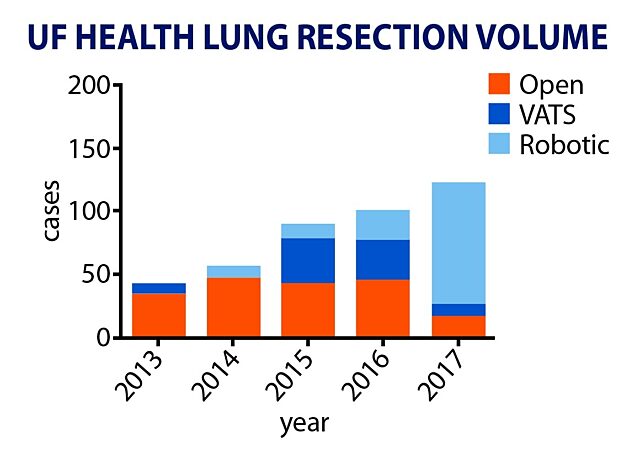Lung cancer treatment plan second opinion
Once you’ve received an initial diagnosis of lung cancer, it may be worth it to request a second opinion to consider the many available treatment options and choose one that’s best for you.
At the UF Health Cancer Center, we treat a significant number of patients who seek a second opinion. In most cases, minimally invasive thoracic surgery can be offered instead of the traditional open approach.
The UF Health thoracic surgeons’ range of expertise includes management of small cell and non-small cell lung cancer, as well as chest wall tumors, mesothelioma, thymic tumors and other less common malignancies of the lung.
Potential benefits of minimally invasive thoracic surgery
- Shorter hospital stay
- Faster recovery and return to normal daily activities
- Improved pain control
- Optimized precision and safety
Cases that were considered non-resectable (referring to a tumor that cannot be removed with surgery) also come to us, and we often times provide a viable curative option.
Our thoracic surgeons are fellowship-trained to perform open, minimally invasive and robotic lung resections. While we offer minimally invasive and robotic techniques for most of our patients, open surgery is still applied in more complex cases to provide a complete resection and to spare lung tissue whenever possible.
Advanced minimally invasive and robotic techniques
- Video-Assisted Thoracic Surgery (VATS) - This type of procedure uses a small video camera that is inserted into the patient’s chest via small incisions. This camera allows the surgeon to view images of the inside of the chest on a video monitor and helps guide the surgeon while performing the procedure. This technique may result in a shorter hospital stay, less pain and less scarring than traditional open surgery.
- da Vinci® lobectomy – This technique uses very small tools attached to a robotic arm that the surgeon controls with a computer, which translates his/her hand movements into smaller and more exact maneuvers with these tiny instruments inside the body. This allows surgeons to operate with enhanced vision, precision and control to remove part of the lung. It may result in a shorter hospital stay, shorter chest tube duration, less or similar rate of blood loss and/or transfusions, and less scarring than open surgery.
Ways we demonstrate our commitment to care
- Minimally invasive lung cancer staging with EBUS in 100 percent of applicable cases
- 90 percent of new lung cancer referrals seen within seven days
- Majority of lung cancer surgeries are done with minimally invasive approach (VATS and robotics) with significant decrease in length of hospital stay
- More than 10 clinical trials open for enrollment in lung cancer
- 100 percent non-squamous lung cancers get their tumor samples analyzed for molecular markers to identify patients who will qualify for personalized therapy. In addition to testing for PD-L1, ALK and ROS1 status, we test for mutations in 115 cancer genes in our in-house molecular pipeline.
- Full spectrum of lung-sparing approaches whenever indicated.
Lung resection surgeries by type at UF Health
Our thoracic surgeons are fellowship-trained to perform open, minimally invasive, and robotic lung resections.
While we offer minimally invasive and robotic techniques for many of our patients, open surgery is still applied to more complex cases to provide a complete resection and to spare lung tissue wherever possible.
